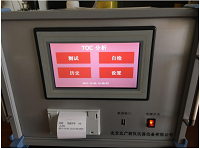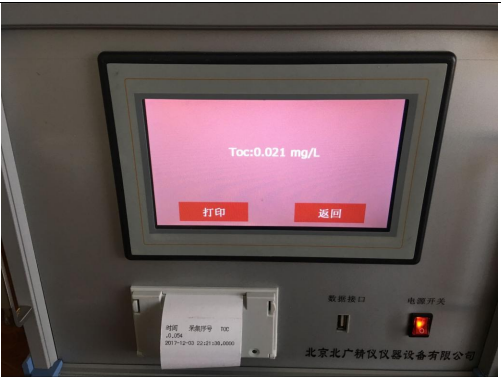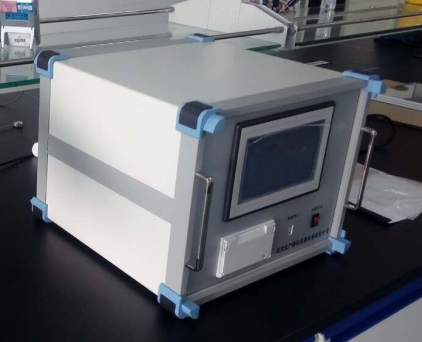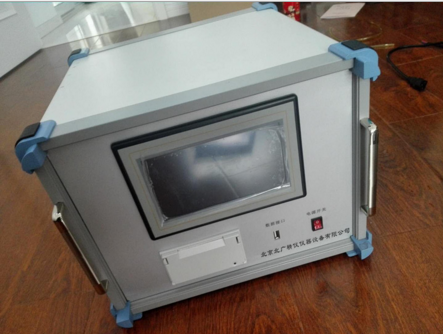
在线纯水总有机碳分析仪 产品特点
1.仪器采用便携设计,使用轻便,方便移动至取样点。
2.采用嵌入式系统,触摸屏设计,纯中文操作方便简易。
3.针对制药用水(TOC含量在1000ppb以下)总有机碳含量的检测设计,进行检测。
4.配备大量的储存空间,能够存储大量的测试数据。
5.中文打印,输出测试参数、测试结果。
6.在使用、贮存和更换过程中不需要气体或试剂,无移动部件,减少维修和维护成本。
7.当测试样品浓度超过规定限度,仪器能够自动报警,并输出控制信号。
8.符合国家2010版《中国药典》规定的测试方案,可以提供IQ/OQ/PQ服务。
在线纯水总有机碳分析仪 应用领域:
制药用水(纯化水、注射用水)的在线监测和实验室测试,以及清洁验证;
环保测试、电子行业、食品行业等。
性能规格:
测量范围:0.01mg/L~1.000 mg/L(此处可调)
精度:?4%测试范围
分辨率:0.001mg /L
分析时间:连续分析
响应时间:6分钟之内
检测极限:0.001mg /L
样品温度:1- 95℃
重复性误差:≤3%
电源要求/功能:220V
显示屏:彩色触摸屏
操作控制:无线蓝牙技术;
仪器各部件的安装、连接
开箱后,按以下步骤进行安装:
── 根据装箱单检查仪器是否齐备。
── 确定仪器在运输过程中没有遭到损坏。
── 拆除机箱的外包装,将其置于正确位置 。
── 检查仪器保险丝是否装好,连接市电电缆到接线端子。
── 根据安装图连接进液和出液管路 。
── 系统通电 。
工作原理
本仪器采用紫外氧化的原理,将样品中的有机物氧化为二氧化碳,二氧化碳的测试采用的是直接电导率法,通过测试经过氧化反应的样品的总碳含量和未经过氧化反应的样品总无机碳的含量差值来测定总有机碳含量,即:总有机碳(TOC)=总碳(TC)-总无机碳(TIC)。
主要特征:
(1) 高精度、高灵敏度,操作简单。
(2) 人性化操作界面,有一键运行功能,自动管路清洗功能。
(3) 高性能CPU,触摸屏设计,超大640*480点阵真彩显示器。
(4) 不用拆开机箱更换UV灯和泵管。
(5) 检测上限可设定,自动上限报警功能。
(6) 具有RS232数据接口,历史数据可存储6个月。
(7) 离线检测和在线检测可选配。
(8) 具有打印功能
系统组成
TOC分析仪的组成包括以下7个主要部分:
① 在线检测装置(在线型仪器配备)
② 样品蠕动泵
③ 分流器
④ 氧化反应器
⑤ 二氧化碳传感器
⑥ 微处理控制器和电子线路板
⑦ 输出接口
分流器
水样进入仪器后分成相同流量的两路,其中一路通过延迟线圈进入二氧化碳传感器,检测TIC,另一路通过氧化反应器利用紫外灯(UV灯)加二氧化钛薄膜光催化氧化作用将有机物分解为二氧化碳,进入二氧化碳传感器检测TC。总有机碳可通过这个差值计算得到:TOC = TC–TIC。
二氧化碳传感器
仪器上安装有两个二氧化碳传感器,由电导率传感器和温度传感器组成。电导率测量采用双精度技术,可以实现自动校准和温度补偿。TIC传感器用于检测未经氧化的水样中二氧化碳浓度,同时检测水样的电导率值;TC传感器用于检测水样本身含有的二氧化碳和水样中有机物经分解后产生的二氧化碳浓度的总和。
使用与操作方法
开始检测并计入检测次数,检测完毕后显示最后一次检测结果,其中几次检测的结果均自动保存在查询记录当中。检测次数的设置方式为:用“选择”键移动光标,用“设置”键修改数字,按“确定”键进行确认,进入分析界面。先进行四次冲洗过程
环境要求
仪器应在一个恒温恒湿且适于工作的环境中进行。避免阳光直射和超常温度;温度过高(超过104?F,40℃)会导致运行失常,温度过低(低于50?F,10℃)会导致测量值误差过大。
注意事项
● 该仪器初始的包装材料需小心保存,安装需由本公司的专业技术人员进行操作。
● 若仪器由于任何原因必须返修,必须将其装入原纸箱中以防运输途中损坏。
测试准备
1)将仪器安放在平稳、清洁的操作台上;
2)准备好存储废液的容器,并且把出液口的管路接到容器中;
3)准备好待测的样品液。对于长时间没有测试的仪器,一定要进行管路冲洗,
冲洗时间一般在15 到 30 分钟左右。
Product features
1. The instrument adopts a portable design, which is lightweight and easy to move to the sampling point.
2. Adopting embedded system and touch screen design, pure Chinese operation is convenient and simple.
3. Design and conduct testing for the total organic carbon content of pharmaceutical water (TOC content below 1000ppb).
4. Equipped with a large amount of storage space, capable of storing a large amount of test data.
5. Print in Chinese, output test parameters and test results.
6. No gas or reagents are required during use, storage, and replacement, and there are no moving parts, reducing repair and maintenance costs.
When the concentration of the test sample exceeds the specified limit, the instrument can automatically alarm and output a control signal.
8. According to the testing plan specified in the 2010 edition of the Chinese Pharmacopoeia, IQ/OQ/PQ services can be provided.
Application field:
Online monitoring and laboratory testing of pharmaceutical water (purified water, injection water), as well as cleaning validation;
Environmental testing, electronics industry, food industry, etc.
Performance specifications:
Measurement range: 0.01mg/L~1.000 mg/L (adjustable here)
Accuracy:?4% Test range
Resolution: 0.001mg/L
Analysis time: continuous analysis
Response time: Within 6 minutes
Detection limit: 0.001mg/L
Sample temperature: 1-95℃
Repeatability error:≤3%
Power requirements/function: 220V
Display screen: Color touch screen
Operation control: wireless Bluetooth technology;
Installation and connection of various components of the instrument
After unpacking, follow the following steps for installation:
Check if the instruments are complete according to the packing list.
Ensure that the instrument has not been damaged during transportation.
Remove the outer packaging of the chassis and place it in the correct position.
Check if the instrument fuse is installed properly and connect the mains cable to the wiring terminal.
Connect the inlet and outlet pipelines according to the installation diagram.
Power on the system.
operational principle
This instrument adopts the principle of ultraviolet oxidation to oxidize organic matter in the sample to carbon dioxide. The measurement of carbon dioxide is carried out using the direct conductivity method. The total organic carbon content is determined by measuring the difference between the total carbon content of the sample that has undergone oxidation reaction and the total inorganic carbon content of the sample that has not undergone oxidation reaction. That is, total organic carbon (TOC)=total carbon (TC) - total inorganic carbon (TIC).
Main features:
(1) High precision, high sensitivity, and simple operation.
(2) Humanized operation interface, with one click operation function and automatic pipeline cleaning function.
(3) High performance CPU, touch screen design, large 640 * 480 dot matrix true color display.
(4) No need to open the chassis to replace the UV lamp and pump tube.
(5) The detection upper limit can be set, with automatic upper limit alarm function.
(6) Equipped with RS232 data interface, historical data can be stored for 6 months.
(7) Offline detection and online detection are optional.
(8) With printing function
system composition
The composition of TOC analyzer includes the following 7 main parts:
①Online detection device (equipped with online instruments)
②Sample peristaltic pump
③Diverter
④Oxidation reactor
⑤Carbon dioxide sensor
⑥Microprocessor controllers and electronic circuit boards
⑦Output interface
Diverter
After entering the instrument, the water sample is divided into two paths with the same flow rate. One path enters the carbon dioxide sensor through a delay coil to detect TIC, while the other path decomposes organic matter into carbon dioxide through the photocatalytic oxidation of titanium dioxide film using a UV lamp in an oxidation reactor, and enters the carbon dioxide sensor to detect TC. The total organic carbon can be calculated by this difference: TOC=TC–TIC.
Carbon dioxide sensor
There are two carbon dioxide sensors installed on the instrument, consisting of conductivity sensors and temperature sensors. The conductivity measurement adopts dual precision technology, which can achieve automatic calibration and temperature compensation. TIC sensors are used to detect the concentration of carbon dioxide in unoxidized water samples, while also detecting the conductivity value of the water samples; The TC sensor is used to detect the total concentration of carbon dioxide contained in the water sample itself and the carbon dioxide produced by the decomposition of organic matter in the water sample.
Usage and operation methods
Start the detection and count the number of detections. After the detection is completed, the last detection result will be displayed, and the results of several detections will be automatically saved in the query record. The way to set the number of detections is to use the "Select" key to move the cursor, use the "Set" key to modify the number, press the "OK" key to confirm, and enter the analysis interface. Perform four flushing processes first
Environmental requirements
The instrument should be operated in a constant temperature, humidity, and suitable working environment. Avoid direct sunlight and abnormal temperatures; Excessive temperature (over 104?F, 40℃) can cause abnormal operation, while low temperature (below 50?F, 10℃) can lead to significant measurement errors.
matters needing attention
The initial packaging material of the instrument needs to be carefully stored, and installation needs to be carried out by our company's professional technical personnel.
If the instrument needs to be repaired for any reason, it must be packed in the original cardboard box to prevent damage during transportation.
Test preparation
1) Place the instrument on a stable and clean operating table;
2) Prepare a container for storing waste liquid and connect the outlet pipeline to the container;
3) Prepare the sample solution for testing. For instruments that have not been tested for a long time, it is necessary to perform pipeline flushing,
The flushing time is generally around 15 to 30 minutes.
业务咨询:932174181 媒体合作:2279387437 24小时服务热线:15136468001 盘古机械网 - 全面、科学的机械行业免费发布信息网站 Copyright 2017 PGJXO.COM 豫ICP备12019803号